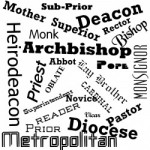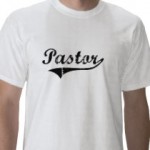Stayed Tuned for More on Church Polity
So far in my series on church polity, I have described the three major forms of church government: episcopal, presbyterian, and congregational. The major differences in the three forms of polity concern who has final authority and decision-making responsibility for a church:
episcopal: one person
presbyterian: a group of people
congregational: all members of a local church
Next week, I will continue this series, adding some comments of my own.
But, for now, I have a question for you, my dear readers. If you had to choose one of the three (and you had no other choices), which of the three would you choose, and why? No cheating by offering other options.
That Kind of Pastor
David Fitch from “Reclaiming the Mission” has written a thought-provoking post called “The Kinds of Pastors We Need and the Future of Evangelicalism in N America.”
In the post, David suggests that American churches are growing bigger (toward megachurches – he calls them “what is left of the Christendom populations”), disappearing (churches around 200), or birthed as/becoming small, missional communities. (He adds much more to this, but I want to jump to the next point.)
He then lists the characteristics of leaders these small, missional communities will need:
1.)BE RESOURCEFUL – OFTEN ABLE TO EARN THEIR OWN LIVING
2.) COMMUNAL SHEPHERDS – CULTIVATORS OF COMMUNITY IDENTITY IN MISSION
3.) INTERPRETIVE LEADERS -Â FUNDERS OFÂ IMAGINATION THRU SCRIPTURE FOR WHAT GOD IS DOING AMONG US AND AROUND US
4.) DIRECTORS OF SPIRITUAL FORMATION – SHAPERS OF PLACES THAT SHAPE OUR LIVES INTO CHRIST AND HIS MISSION
5.) LEADERS WHO GIVE AWAY POWER – DISPERSERS OF AUTHORITY AND LEADERSHIP INTO THE NIEGHBORHOODS
What do you think of David’s list? Do you think “that kind of pastor” would be helpful? What would you add to, remove from, or change about his list?
Church Polity – Congregational
This is the fourth post in my series on church polity. (See my posts “Church Polity – Introduction,” “Church Polity – Episcopal,” and “Church Polity – Presbyterian.“) In this post, I am going to discuss the “congregational” form of church government.
According to Wikipeadia:
The term “congregational polity” describes a form of church governance that is based on the local congregation. Each local congregation is independent and self-supporting, governed by its own members.
While there are many denominations and independent churches based on congregational polity, many descended from the anabaptist, puritan, and baptist traditions. As the wikipedia definition explains, in congregational churches the members of each local churches make decisions that affect that church. Congregational churches are also known for being independent and autonomous.
For example, consider this statement in the Baptist Faith and Message of the Southern Baptist Convention:
A New Testament church of the Lord Jesus Christ is an autonomous local congregation of baptized believers, associated by covenant in the faith and fellowship of the gospel; observing the two ordinances of Christ, governed by His laws, exercising the gifts, rights, and privileges invested in them by His Word, and seeking to extend the gospel to the ends of the earth. Each congregation operates under the Lordship of Christ through democratic processes.
Those who support congregational polity point to the times in Scripture where “the whole church” was involved in the decision-making process. They also point to the doctrine of the priesthood of all believers.
Congregationalism arose as a form of church government alongside presbyterianism and around the time of the rise of the democratic form of government (in modernity, that is).
Congregational churches may appoint committees or even individuals to oversee certain tasks or functions, but the final authority always rests with the entire church membership.
Similarly, church with congregational polity may associate with other churches, but the decision-making power rests within each local church organization, and is not usually shared among churches – even churches of the same denomination or association.
————————————————–
Church Polity Series
Church Polity – Presbyterian
This is the third post in my series on church polity. (See my posts “Church Polity – Introduction” and “Church Polity – Episcopal.”) In this post, I am going to discuss the “presbyterian” form of church government.
According to Wikipedia:
Presbyterian polity is a method of church governance typified by the rule of assemblies of presbyters, or elders. Each local church is governed by a body of elected elders usually called the session or consistory, though other terms, such as church board, may apply. Groups of local churches are governed by a higher assembly of elders known as the presbytery or classis; presbyteries can be grouped into a synod, and synods nationwide often join together in a general assembly. Specific roles in church services are reserved for an ordained minister or pastor known as a teaching elder, or a minister of the word and sacrament.
For example, this is how the Church of Scotland describes its organization:
Church of Scotland government is organised on the basis of courts, mainly along lines set between 1560 and 1690. Each of these courts has developed committees, which may include other members of the Church, and those at national level now employ full-time staff…
At local level: the parish – the court is a kirk session. Kirk sessions oversee the local congregation and its parish, and consist of elders presided over by a minister.
At district level: the court is a presbytery. Presbyteries consist of all the ministers in the district and an equal number of elders, along with members of the diaconate (a form of ordained ministry, usually working in a complementary role in a ministry team in both parish and industry sector contexts).
At national level: the court is the highest court of the Kirk – the General Assembly. The General Assembly consists of around 400 ministers, 400 elders, and members of the diaconate, all representing the presbyteries.
Notice that the focus of the church government is on groups of leaders, either at the local, district, or national level. These groups make decisions for the church and hold authority over the church.
Other denominational churches and independent churches practice the presbyterian form of church government called “elder rule.” For example, this site supports elder rule:
As those who rule in the church, elders are not subject to any higher earthly authority outside the local assembly. Their authority over the church is not by force or dictatorial power, but by precept and example.
Similarly, those churches controlled by a board (whether the board is called deacons, elders, or directors), would be considered to have presbyterian polity.
Those who support the presbyterian form of church government, typically point to the use of the term “elders” (or presbyters) in the New Testament. Similarly, the proponents point to the use of elders in the plural, as well as plural forms of authority in the Old Testament and among the apostles.
Presbyterian polity rose to prominence during the Reformation when leaders of the various reformed churches decided to throw off the monoepiscopal rule of the Catholic Church.
————————————————–
Church Polity Series
Church Polity – Episcopal
This is the second post in my series on church polity. (See my post “Church Polity – Introduction.”) In this post, I am going to discuss the “episcopal” form of church government.
(Note: There are actually no pure forms of any of the three types of church government. Most churches use mixed forms. So, when I talk about “episcopal” forms of church government, I’m speaking about those churches in which the episcopal form is the primary form.)
Once again, we’ll start with Wikipedia’s definition:
Episcopal polity is a form of church governance which is hierarchical in structure with the chief authority over a local Christian church resting in a bishop (Greek: episcopos). This episcopal structure is found most often in the various churches of Roman Catholic, Eastern Orthodox and other Eastern Church, and Anglican lineage.
Here are a few entries from a Catholic reference site to help explain one form of the episcopal government:
Primacy: Papal primacy refers to the pope’s authority over the whole church.
Cardinal: Cardinals are appointed by the pope and constitute a kind of senate of the Church, and aid the pope as his chief counselors.
Bishops: The chief priest of a diocese. Bishops are responsible for the pastoral care of their dioceses. In addition, bishops have a responsibility to act in council with other bishops to guide the Church.
Presbyterial Council: Also known as the priests’ council, this is the principal consultative body mandated by the Code of Canon Law to advise the diocesan bishop in matters of pastoral governance. It consists of bishops and priests serving the diocese.
Pastor: A priest in charge of a parish or congregation. He is responsible for administering the sacraments, instructing the congregation in the doctrine of the Church, and other services to the people of the parish.
(Also see Article 6 of the Catechism of the Catholic Church.)
Similarly, the Church of England explains that the bishop of a diocese is the party responsible for the diocese:
The Canons of the Church of England state that the diocesan bishop is ‘the chief pastor of all that are within his diocese, as well laity as clergy, and their father in God’. Bishops have a particular responsibility for apostolic teaching and doctrinal orthodoxy and are to be themselves ‘an example of righteous and godly living’. They also have responsibility for worship, with the right ‘of conducting, ordering, controlling and authorising all services’.
The primary difference between the episcopal form of church government and the presbyterian form of church government is that final authority rests in one person in the episcopal form, while final authority rests in a group in the presbyterian form.
Those who espouse the episcopal form of church government usual point the necessity of having one person in charge. Similarly, they often point to the unity realized by having a single person in an authoritative position. From Scripture, they point to the hierarchy in the Old Testament levitical priesthood, as well as the role of the apostles in the New Testament. Specifically, they point to the Greek “episkopos” word group, from which we get the English term “bishop.”
The episcopal form of church government is also highlighted in Ignatius’ letters written sometime around 100 A.D.
Note that regardless of what the “governance” is called, if final authority rests in one person, then that church has an episcopal form of government in reality. This is true of many independent churches with a single strong leader (especially if that leader also started the church). A church with a senior pastor who holds final authority would also be an example of episcopal polity.
————————————————–
Church Polity Series
Those Old People
Eric at “A Pilgrim’s Progress” has started a very interesting series “On Elders/Overseers/Pastors in the Bible.” The first post in his series is called “Elders in Acts 11:30.”
Here is the passage in question:
Now in these days prophets came down from Jerusalem to Antioch. And one of them named Agabus stood up and foretold by the Spirit that there would be a great famine over all the world (this took place in the days of Claudius). So the disciples determined, everyone according to his ability, to send relief to the brothers living in Judea. And they did so, sending it to the elders by the hand of Barnabas and Saul. (Acts 11:27-30 ESV)
Now, the term “elders” in that passage is a translation of the adjective Ï€ÏεσβÏτεÏος (presbuteros). As I said, this is actually an adjective (in the comparative form) that simply means “older.” In English, we have to supply a noun (which was not necessary in Greek). Since the adjective is masculine, we usually supply the noun “man,” although it could be generic. So, instead of being translated as “elder” (in the sense of a church “position”), the adjective could also be translated as “older man or older person.” Also, in this instance, the adjective is plural, so it could be translated as “older men or older people.”
Now, here is my question – which I asked Eric, and which is an honest question, because I haven’t decided myself yet: How do we know if Luke was writing about “elders” or if he was writing about “older men or older people”? Did Paul and Barnabas give the “relief” to specific people within the church in Jerusalem who had been recognized by the church as “elders”? Or did they give the relief to older men/people in the church in Jerusalem?
In fact, there are many passages in which this same question could be asked. Did James tell the sick person to summon the elders or older people? (James 5:14) Should the elders who lead well be considered worthy of double honor, or should the older people who lead well be considered worthy of double honor? (1 Timothy 5:17) Did Peter tell the elders how to care for the church or the older people? (1 Peter 5:1-3; note 1 Peter 5:5)
How do we decide which group of people each passage is referring to?
(By the way, Dave Black argues – convincingly, I think – that “older person” is someone who is older than 30.)
Church Polity – Introduction
According to the great, all-knowing Wikipedia:
Ecclesiastical polity is the operational and governance structure of a church or Christian denomination. It also denotes the ministerial structure of the church and the authority relationships between churches. Polity is closely related to Ecclesiology, the study of doctrine and theology relating to church organization.
Theopedia provides a similar definition:
Church government (or sometimes church polity) is that branch of ecclesiology (study of the church) that addresses the organizational structure and hierarchy of the church. There are basically three types of church government that have developed in the various Christian denominations: the episcopal, the presbyterian, and the congregational.
So, church polity (or ecclesiastical polity or church government) refers to organizational or governing structure among the church. Polity is closely related to questions of hierarchy and authority. And, in fact, one’s view of ecclesiology is strong influenced by one’s view of church polity (and vice versa).
The definition from theopedia also tells us that three basic types of church government are episcopal, prebyterian, and congregational. I’ve planned a blog post about each of these three basic types of church polity. In each one, I will talk about the scriptural justification as well as the strengths and weaknesses of each type of government.
To begin with, though, I want to point out what I think is a major weakness of each of these three types of polity as they are generally practiced today. For the most part, church polity deals with organization and hierarchy. The church, however, is not an organization or hierarchy. The church is a group of people. Don’t misunderstand me: any group of people will be organized in some way, whether that organized is intentional or not, highly structured or not. Whenever two or more people get together, there will be some type of organization.
However, the organization is not the church. Too often today the organization and especially the leadership is confused as being the church. The church comes before the organization, supersedes the organization, and is more important than the organization. But, when the church acts as if organization and hierarchy and government make up the church, the growth of the church will be stunted. (I’m not talking as much about numerical growth as much as maturity growth.)
Even though the church comes before the organization, organizational and governmental issues often drive the direction of the church, even when the matters being governed are not truly “church” issues. Often, polity revolves around making other organizational decisions, which should have very little, if anything, to do with the life of the church. But, when the church puts too much emphasis on organization, these organizational issues soon take on a life of their own, and begin to take over the life of the church.
So, while organizational issues are not as important as the church itself, often the church makes organizational issues more important because of the way they handle polity, organization, structure, hierarchy, and decision making. I’ll talk a little about this in each of the three posts related to the three basic forms of church government.
Then, in the last post of this series, I will talk about a fourth form of church government, one that is not episcopal, presbyterian, or congregational. This fourth type of church polity also has scriptural roots and has strengths and weaknesses.
I look forward to your interaction in these posts.
————————————————–
Church Polity Series
Stepping through his reasoning
As I told you last week, my friend Eric from “A Pilgrim’s Progress” told us that he resigned from professional pastoring. This week, he wrote a post in which he explained his “Reasoning for Resigning.”
In his post, Eric steps through the reasons that he chose to resign from professional pastoring, and the reasons have to do with Scripture, not burn-out, or anger or maltreatment, or anything like that.
Now, I know that many who read here (or at least some) will disagree with Eric’s conclusions. But, you can tell that he is attempting to live according to his interpretation of Scripture and to be true to his convictions. Actually, I’ve talked to many pastors who have come to the same conclusion as Eric regarding professional pastoring, but they have not taken the next step – the step that Eric has chosen to take in resigning.
I hope that Eric continues to post about his decisions and his life. Specifically, I asked him to tell us how he sees non-professional pastoring working in the church today.
Leadership is not decision-making
Since I’ve been talking about leadership and service lately, I thought I would re-publish one of the posts that I wrote two years ago on a similar subject. The post is called “Leadership is not decision-making.” Leaders – along with the entire church – may need to make decisions, but this is not a factor of being a leader. Instead, it is a response to the Spirit who indwells all believers, not just leaders. No, the main factor of being a leader is service… serving other people… no decision-making.
————————————————-
Leadership is not decision-making
When we study the idea of leadership in Scripture, we find that leadership in the church is not decision-making, and decision-making is not leadership. When we study the idea of leadership in today’s church, we find that leadership is primarily about decision-making.
Ready almost any book on ecclesiology or church leadership, and you’ll read about various forms of “church government” or “church polity”. You’ll read about the episcopal form, in which a bishop (or senior pastor) makes decisions for the church. You’ll also read about the presbyterian form, in which a group of people (elders, pastors, staff, or deacons) make decisions for the church. Finally, you’ll read about the congregational form, in which the church itself makes the decisions.
But, when we search Scripture to determine who should make decisions for the church, we come up short. Scripture does not deal with the concept of making decisions for the church. Yes, we find church leadership in the church: elders, bishops, pastors, deacons, teachers, etc. But, these are not mentioned in the context of making decisions. However, we do find that decisions are made in Scripture.
In Acts 6, the people come to the apostles with a problem. Some of the widows are not receiving food, while others are receiving food. The apostles did not make decisions for the people. Instead, the apostles tell the people to take care of the situation. The apostles lead by suggesting characteristics of those who should serve these widows, but they do not make the decision for the people.
In Acts 15, a major question is brought before the apostles: should Gentile Christians become Jews – i.e. should they be circumcised and required to keep the law. The decision that would be made at this time would affect the church for all ages. Who made the decisions? The apostles? Yes, they were part of the decision-making process. The elders? Yes, they were part of the decision-making process. Others? Yes, even Barnabas and Paul were allowed to take part even though they were part of the church in Antioch. In fact, it seems that the entire church took part in the decision-making process. But, certainly the entire church would not have been considered leaders.
In 1 Corinthians 5, Paul writes to the church in Corinth about a “brother” who was living an immoral life. The church was doing nothing about this situation, and Paul admonished them for it. Paul told them what he thought they should do about this situation, but who was responsible for making the decision to actually do it? Apparently, Paul left that up to the church.
In each case, the “leaders” involved guided and taught and admonished and exhorted, but they did not make decisions for other people. In fact, in 3 John, we see an example of a “leader” who does make decisions for people, and John speaks of him (Diotrephes) negatively.
So, if leadership is not about decision-making in Scripture, then what is leadership? Leadership is service – serving people. Service should be the start of the discussion about church leadership, and service should be the end of the discussion about church leadership. Teaching is about service. Sherpherding is about service. Overseeing (watching out for) is about service. Leadership is about service. Those who do not serve are not leaders in the scriptural sense.
When we see discussions about church government (polity) and its different forms, we should recognize that these questions and forms and structures arose after the New Testament was written. For example, it is from Ignatius that we learn that the bishop should make decisions for the church and that the church should do nothing without the approval of the bishop.
Now, this does not mean that scriptural leaders (servants) do not have influence concerning decisions. They do and they should. Assuming that we have recognized leaders because of their spiritual maturity and their service to others (and this is a HUGE assumption that is often not true), then we should ask for their opinions, and we should often follow what they say (Heb. 13:17). Leaders, on the other hand, must recognize that we can selfishly use our influence to get our own way – even when the outcome doesn’t really matter.
Since they are more spiritually mature (we’re assuming, remember), then leaders should be the first to give up their rights for the rights of others. Leaders should be the first to consider others as more important than themselves and, therefore, to consider the opinion of others as more important than their own opinion. When leaders are concerned about a decision, then they influence that decision through service, teaching, admonishment, exhortation, but not by attempting to exercising authority – that authority belongs only to the one head of the church. Leaders must be willing to serve all, and allow Christ to control the decision-making.
But, that’s not what we find today. Instead, when people talk about leadership in the church, they talk about decision-making. Perhaps, we need to stop trying to make decisions, and start serving. If a decision has to be made (and make sure that it actually HAS to be made), then offer your opinion, teach, admonish, exhort, etc. Then, allow the ones affected by the decision to make that decision.
To do that, of course, we’ll have to find leaders who are willing to serve only.
Count others more significant than yourselves
At the beginning of Philippians chapter 2, Paul lays out a very convicting list that should define the life of believers. One of those characteristics is this: “Count others more significant than yourselves” (Philippians 2:3) Another is this: “Let each of you look not only to his own interests, but also to the interests of others” (Philippians 2:4).
Paul then tells us that in order to think like this, we should think the same way that Jesus Christ thought (Philippians 2:5-11).
Have you ever thought about what this should look like in the lives of Christian leaders, elders, pastors, bishops, etc? Do these commands apply to leaders in the church? How?






